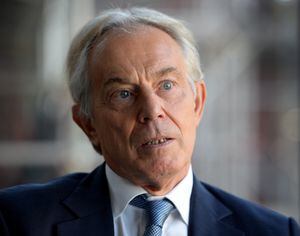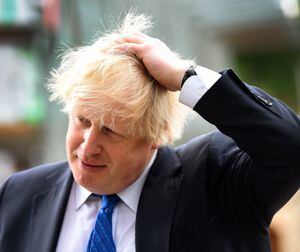Mervyn King: May's Brexit betrayal is worst of all worlds
Mervyn King, the former Governor of the Bank of England who was educated in Wolverhampton, gives his damning assessment of Theresa May's Brexit deal.

When Tony Blair and Boris Johnson unite in their condemnation of the “deal” under which Theresa May proposes that the UK should leave the EU, you know something has gone badly wrong.
The withdrawal agreement is less a carefully crafted diplomatic compromise and more the result of incompetence of a high order.
I have friends who are passionate Remainers and others who are passionate Leavers. None of them believe this deal makes any sense. It is time to think again, and the first step is to reject a deal that is the worst of all worlds.
There have been three episodes in modern history when the British political class let down the rest of the country: in the 1930s, with appeasement; in the 1970s, when the British economy was the “sick man” of Europe and the government saw its role as managing decline; and now, in the turmoil that has followed the Brexit referendum. In all three cases, the conventional wisdom of the day was wrong.

In the first two instances, it took a revolution: in 1940, the dismissal of the prime minister and his replacement by someone better suited to the role of wartime leader; in the 1970s, a political and intellectual upheaval, and a radical new government capable of changing course. Both times, the country escaped ruin by the skin of its teeth. Today’s challenge is of a similar order.
Britain is not facing an economic crisis. It is confronting a deep political crisis. Parliament has brought this on the country.
It voted overwhelmingly to hold a referendum. The public were told they would decide. And the rules of the game were clear: Fifty percent of the vote plus one would settle the matter.
The Prime Minister and the Chancellor at the time said unequivocally that Brexit meant leaving Europe’s single market and customs union. This was the Brexit that, after the referendum, both main political parties promised to deliver.
But a majority of members of Parliament were against leaving, and both parties were split down the middle.
For members of the Labour opposition, the opportunity to undermine the Government outweighed their views on the issue at hand, momentous though it was.
A divided governing party was unable to rely on a majority to support any plan to deliver Brexit.
To be sure, no coherent plan has ever been presented. There are arguments for remaining in the EU and arguments for leaving.
But there is no case whatever for giving up the benefits of remaining without obtaining the benefits of leaving.
Yet that is exactly what the Government is now proposing. It simply beggars belief that a government could be hell-bent on a deal that hands over £39 billion, while giving the EU both the right to impose laws on the UK indefinitely and a veto on ending this state of fiefdom.
Preparations for Brexit based on trade under WTO terms should have started in 2016, immediately after the referendum, as I said at the time.
Britain needed a fall-back position — it is foolish to negotiate without one — and that was the form it should have taken.
An immigration policy for the post-Brexit world could and should have been published in 2016.

But there was no such planning. Instead, the Government pretended that everything could be postponed until an imaginary long-term deal could be negotiated.
This was naive at best, and in the event has proven disastrous. And so Project Fear turned into Project Impossible. It is incompetence on a monumental scale.
Before the referendum, official economic projections intended to scare the country into voting Remain didn’t succeed.
Based on flimsy and arbitrary assumptions, they were subsequently proved wrong. The same strategy has resurfaced.
It saddens me to see the Bank of England unnecessarily drawn into this project.
The Bank’s latest worst-case scenario shows the cost of leaving without a deal exceeding 10 percent of GDP.
Two factors are responsible for the size of this effect: first, the assertion that productivity will fall because of lower trade; second, the assumption that disruption at borders — queues of lorries and interminable customs checks — will continue year after year.
Neither is plausible. On this I concur with Paul Krugman. He’s no friend of Brexit and believes that Britain would be better off inside the EU — but on the claim of lower productivity, he describes the Bank’s estimates as black box numbers' that are 'dubious' and 'questionable'.
And on the claim of semi-permanent dislocation, he just says, “Really?” I agree: The British civil service may not be perfect, but it surely isn’t as bad as that.
The UK is a European country, and always will be. Trade and contacts among the nations of Europe can and should continue much as before.
And I have no doubt they will do so. But the political nature of the EU has changed since monetary union. The EU failed to recognise that the euro would demand fiscal and political integration if it was to succeed, and that countries outside the euro area would require a different kind of EU membership.
It was inevitable, therefore, that, sooner or later, Britain would decide to withdraw from a political project in which it had little interest apart from the shared desire for free trade.
Leaving the EU is not the end of the world, any more than it will deliver the promised land. Nonetheless the country is entitled to expect something better than a muddled commitment to perpetual subordination from which the UK cannot withdraw without the agreement of the EU.
Many MPs will argue that 'we are where we are', that it’s too late to change course, and that May’s deal is the only deal available.
But remember, this is a political not an economic crisis. If Blair and Johnson, from opposing political viewpoints, can see the fatal weaknesses of this proposed deal, politicians of all hues should try to do the same.
This deal will not end the divisiveness of the debate about Britain’s relationship with the EU. The Remain camp will continue to argue, correctly, that to align the country indefinitely with laws over which it has no influence is madness, and a second referendum is vital to escape from this continuing nightmare.
And the Leave camp will argue, also correctly, that it is intolerable for the fifth largest economy in the world to continue indefinitely as a fiefdom.
If this deal is not abandoned, I believe that the UK will end up abrogating it unilaterally — regardless of the grave damage that would do to Britain’s reputation and standing.
Vassal states do not go gently into that good night. They rage. If this Parliament bequeaths to its successors the choice between a humiliating submission and the abrogation of a binding international treaty, it will not be forgiven — and will not deserve to be.





